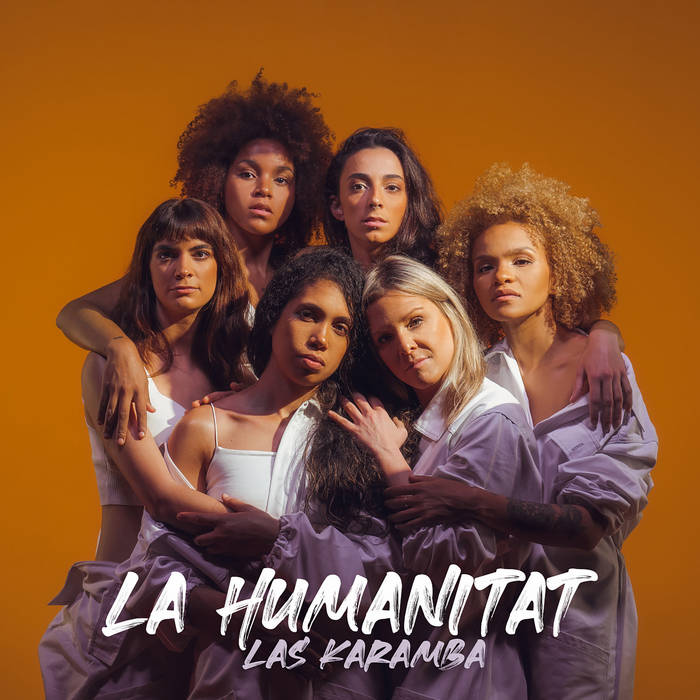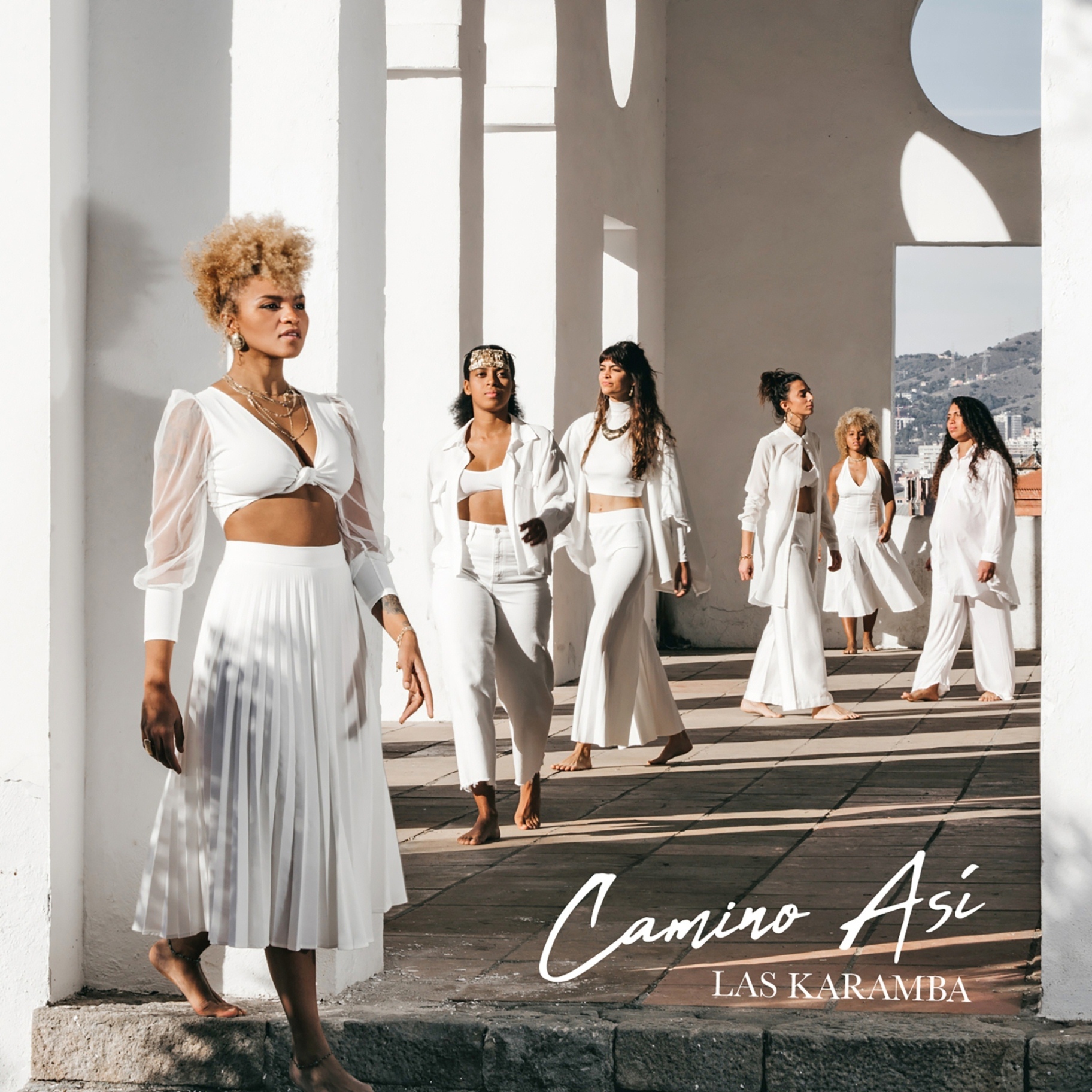Las Karamba


They are Las Karamba, a musical current of feminine energy that converges to tell stories and experiences to the rhythm of Cuban music, ranging from bolero to son, salsa, rumba, and even rap. A multicultural mix full of color born in Barcelona, formed by Ahyvin Bruno (voice and Güiro), Ahylin Bruno (congas and backing vocals), Liviet Ojeda (bass and backing vocals), Natasha Arizu (keyboard and backing vocals), Rita Baulida (timbales), and María Gil (flute). Six mestizo, migrant women, and musicians who will present their new studio work "Te lo digo cantando" on April 19th.
Their first album "Camino Así," released in 2021, opened doors and paths that have led to unique experiences and performances throughout much of Europe, as well as their first concerts in Querétaro, Mexico. Over these 3 years, they have lived very intense moments, which have allowed them to get to know each other better, becoming confidants for each other and knowing how to understand where the other person is at without saying a word.
In the lyrics of this new work, they address the role of women in motherhood, the prejudices and taboos surrounding sexuality, how difficult it is to push artistic projects forward in these times, and many other topics that each of them has experienced in their daily lives. They manage to bring these themes together in "Te lo digo cantando" (Guspira Records), consolidating a more mature sound of their own in which they find a balance between upbeat themes that make you dance and those that aim to empathize with the message of the song.This album unveils the song "No Todo Es Lo Que Parece" (Not Everything Is What It Seems), the perfect thread of the album in which they present a theme full of energy and color, offering a blend of changüí, a traditional rural Cuban genre, to reaffirm their message of finding strength to fight for everything they want and yearn for. Next comes "Ego," a move towards a more assertive stance with one of the most likely tracks on the album. The group's conga player, Ahylin Bruno, takes the lead vocals and delivers a protest rap about the lack of empathy and egocentrism. This perspective is further concretized in "Cocteleo" alongside the talented Madrid-based artist Elena Salguero. Together, they create an ode to free sexuality where they venture for the first time into the Latin urban genre, specifically with a RaggaMorffa, better known as "Reparto" or "Música Repartera". With a slower and calmer rhythm, we encounter "Estoy Aquí" (I'm Here) and "Duele" (It Hurts), in which they embrace the intense emotions present in interpersonal relationships. They tell a personal story that begins with pain and ends with overcoming and learning. It's a demonstration of the metamorphosis that can occur when it comes to love, healthy and respectful. Also in "Me lo dijo el silencio" (Silence Told Me), a majestic bolero where Chupi Saigi, pianist and composer, accompanies the moving voices of Ahyvin Bruno and Rita Payés in a story full of nostalgia and memories. "Un Rato Na’ Más" (Just a Little While Longer) is a celebration of life, of simplicity, and of what makes us smile and feel moved. With joy and to the rhythm of Mozambique, it reminds us that life is short and we should enjoy all the little things in our daily lives that make us smile and feel excited.
We arrive at the interlude with "Ninguno puede conmigo (Live)" (None Can Defeat Me - Live), a special song recorded live where, in the form of Cuban rumba, they unite voice and percussion to reach one of the most emotionally powerful songs of the album, "Desde que llegaste" (Since You Arrived). In this song, Las Karamba portray the life-changing experience and what it means to be a mother, expressing all the shared love in motherhood.
"Te lo digo cantando" is an album that aims to tell sorrows with joy. As the great Celia Cruz, the main reference of the group, used to say, and which they have managed to honor in the name of this collection of 9 songs made for those who need positive energy to move forward, or simply for anyone who wants to dance, listen to, or sing along with it at the top of their lungs.
Their first album "Camino Así," released in 2021, opened doors and paths that have led to unique experiences and performances throughout much of Europe, as well as their first concerts in Querétaro, Mexico. Over these 3 years, they have lived very intense moments, which have allowed them to get to know each other better, becoming confidants for each other and knowing how to understand where the other person is at without saying a word.
In the lyrics of this new work, they address the role of women in motherhood, the prejudices and taboos surrounding sexuality, how difficult it is to push artistic projects forward in these times, and many other topics that each of them has experienced in their daily lives. They manage to bring these themes together in "Te lo digo cantando" (Guspira Records), consolidating a more mature sound of their own in which they find a balance between upbeat themes that make you dance and those that aim to empathize with the message of the song.This album unveils the song "No Todo Es Lo Que Parece" (Not Everything Is What It Seems), the perfect thread of the album in which they present a theme full of energy and color, offering a blend of changüí, a traditional rural Cuban genre, to reaffirm their message of finding strength to fight for everything they want and yearn for. Next comes "Ego," a move towards a more assertive stance with one of the most likely tracks on the album. The group's conga player, Ahylin Bruno, takes the lead vocals and delivers a protest rap about the lack of empathy and egocentrism. This perspective is further concretized in "Cocteleo" alongside the talented Madrid-based artist Elena Salguero. Together, they create an ode to free sexuality where they venture for the first time into the Latin urban genre, specifically with a RaggaMorffa, better known as "Reparto" or "Música Repartera". With a slower and calmer rhythm, we encounter "Estoy Aquí" (I'm Here) and "Duele" (It Hurts), in which they embrace the intense emotions present in interpersonal relationships. They tell a personal story that begins with pain and ends with overcoming and learning. It's a demonstration of the metamorphosis that can occur when it comes to love, healthy and respectful. Also in "Me lo dijo el silencio" (Silence Told Me), a majestic bolero where Chupi Saigi, pianist and composer, accompanies the moving voices of Ahyvin Bruno and Rita Payés in a story full of nostalgia and memories. "Un Rato Na’ Más" (Just a Little While Longer) is a celebration of life, of simplicity, and of what makes us smile and feel moved. With joy and to the rhythm of Mozambique, it reminds us that life is short and we should enjoy all the little things in our daily lives that make us smile and feel excited.
We arrive at the interlude with "Ninguno puede conmigo (Live)" (None Can Defeat Me - Live), a special song recorded live where, in the form of Cuban rumba, they unite voice and percussion to reach one of the most emotionally powerful songs of the album, "Desde que llegaste" (Since You Arrived). In this song, Las Karamba portray the life-changing experience and what it means to be a mother, expressing all the shared love in motherhood.
"Te lo digo cantando" is an album that aims to tell sorrows with joy. As the great Celia Cruz, the main reference of the group, used to say, and which they have managed to honor in the name of this collection of 9 songs made for those who need positive energy to move forward, or simply for anyone who wants to dance, listen to, or sing along with it at the top of their lungs.
Discography

Multimedia




